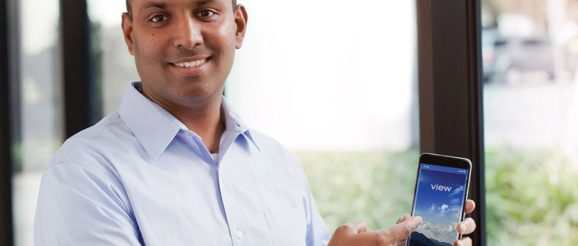A View of Innovation

Sometimes the opportunity for innovation is in plain sight. Have you ever considered how much is spent in real estate to feature picture-perfect views and install crystal-clear glass windows – only to have occupants miss those amazing views due to the heat and glare that also comes through?
Window coverings are purchased at an additional cost due to the discomfort of the individuals inside and the well-intended benefits are lost. Look around any major city, and you’ll notice that roughly two-thirds of building windows are permanently covered with blinds or shades. It defeats the whole idea of using windows in the first place. What if there was a better way?
If you like this, subscribe here for more stories that Inspire The Future.
After all, it hasn’t always been like this. For most of history, humans have lived in harmony with the outdoors; remember, we are originally an outdoor species. But over the course of history, we’ve found a way to create our own shelters, as a way of separating us from the elements and to protect ourselves. First came walls, doors, roofs and floors. Then we discovered that melting sand could make sheets of glass – a solid material you could see through. Windows were not always accessible to everyone in the early days and were indeed a source of luxury and pride for those who could afford them.
Now a staple of modern architecture, glass has kept some of its magical allure – creating a barrier to the outside world, yet still inviting in the views and natural light to lighten even the darkest of rooms. Recently, we’ve seen bigger and clearer windows appearing as the demand increases for a better connection to the outdoors. But this, “Also creates issues in terms of heat and glare – the building gets inefficient … and people are uncomfortable thermally and visually and then you are using blinds and shades to control the light,” says Dr. Rao Mulpuri, CEO of View, Inc. and a member of YPO.
“My colleagues wake up each day believing in something that no one else believes yet. This common purpose and mission is what binds us together and enables us to create real change.”
Based in Silicon Valley, View manufactures a new generation of smart windows that let in natural light and views and enhance mental and physical wellbeing. View’s customers include Century Link, Overstock, FedEx, WeWork, Facebook, Hewlett Packard Enterprise, Regeneron and Kaiser Permanente across 35 million square feet of buildings space with another 35 million in progress. The company has also made great progress bringing smart windows to airports with installations at San Francisco International Airport, Boston Logan International Airport, Seattle-Tacoma International Airport and Charlotte Douglas International Airport. And in June 2018, Dallas Fort Worth International Airport announced they had awarded a contract to View to install smart windows in all DFW’s passenger terminals.
“While dynamically changing glass technology, that adjusts itself to light and heat is already 50 years old, it never managed to move past small applications, such as transition sunglasses, car rear-view mirrors, and some airplanes. Up until ten years ago, when View stepped in, it was an elusive technology that didn’t lend itself to large-scale use in real estate. We have developed a self-tinting smart window, powered by a sophisticated intelligence engine that responds intuitively to outside conditions, day or night,” says Mulpuri.
“Someday, every window will be smart,” muses Mulpuri. “Today, every communication device is mobile, yet landlines ruled only a short few years ago. Likewise, there’s no reason to install windows and then cover them up to the detriment of the occupants’ health and wellness.” The company has yet to come across a customer who says, “I love my blinds”.
The real estate industry is the largest in the world, to the tune of $10 trillion globally, but surprisingly, it’s also the slowest moving – partly due to risk aversion found within its ranks. Mulpuri recognized that technology advancement was the biggest disruptor of the past 100 years and wondered why real estate construction was lagging so far behind. The 21st century is not kind to slow-moving industries – think video stores, camera film and cellphones with keyboards. Mulpuri believes View’s mission is to not only make the simple window better, but to also transform the entire real estate industry. One of Mulpuri’s mentors and friends, Fred Smith, the CEO of FedEx, is keen on reminding his employees, “If you don’t like change, you will hate extinction.”
View currently holds more than 700 patents after ten years of development and an investment of around $1 billion – a hefty price-tag for staying true to their dream of developing technology that will enable smart glass to work at scale.
Aside from eliminating the need for blinds and reducing a building’s energy costs, Mulpuri is most excited about the substantial health benefits View’s windows bring to occupants. A recent HBR articlerevealed natural light is the #1 office perk, and supports a research study by Cornell University Professor Dr. Alan Hedge who found optimization of natural light in an office significantly improves health and wellness among workers. In fact, this research revealed that workers in View Dynamic Glass office environments reported a 51% drop in eyestrain, a 63% drop in headaches and a 56% reduction in drowsiness.
Like most disruptive companies, success is usually a combination of great product and fearless, big thinking. Considering the advice he would give young leaders, Mulpuri believes that picking things that really mattered would be paramount. “Work on something game- changing, because then the journey becomes worth it. You’ll attract great talent and like-minded people and that powerful combination of talent, commitment, and upward spiral of creating something new will make it worthwhile. My biggest advice? Attempt bigger.”
If you like this, subscribe here for more stories that Inspire The Future.
